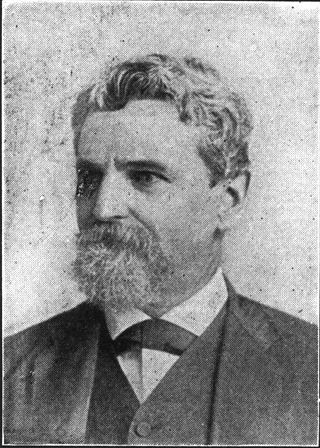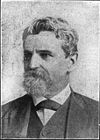
The 1876 United States presidential election was the 23rd quadrennial presidential election, held on Tuesday, November 7, 1876, in which Republican nominee Rutherford B. Hayes faced Democrat Samuel J. Tilden. It was one of the most contentious presidential elections in American history. Its resolution involved negotiations between the Republicans and Democrats, resulting in the Compromise of 1877, and on March 2, 1877, the counting of electoral votes by the House and Senate occurred, confirming Hayes as President. It was the second of five U.S. presidential elections in which the winner did not win a plurality of the national popular vote.

Samuel Jones Tilden was an American politician who served as the 25th governor of New York and was the Democratic nominee in the disputed 1876 United States presidential election.

The Compromise of 1877, also known as the Wormley Agreement or the Bargain of 1877, was an unwritten political deal to settle the intensely disputed 1876 presidential election between Republican Rutherford B. Hayes and Democrat Samuel J. Tilden, ending the filibuster of the certified results and the threat of political violence in exchange for an end to federal Reconstruction. No written evidence of such a deal exists and its precise details are a matter of historical debate, but most historians agree that the federal government adopted a policy of leniency towards the South to ensure federal authority and Hayes's election.

Francis Redding Tillou Nicholls was an American attorney, politician, judge, and a brigadier general in the Confederate States Army during the American Civil War. He served two terms as the 28th Governor of Louisiana, first from 1876 to 1880 after the Reconstruction era ended and from 1888 to 1892.

The Electoral Commission, sometimes referred to as the Hayes-Tilden or Tilden-Hayes Electoral Commission, was a temporary body created by the United States Congress on January 29, 1877, to resolve the disputed United States presidential election of 1876. Democrat Samuel J. Tilden and Republican Rutherford B. Hayes were the main contenders in the election. Tilden won 184 undisputed electoral votes, one vote shy of the 185 needed to win, to Hayes' 165, with 20 electoral votes from four states unresolved. Both Tilden and Hayes electors submitted votes from these states, and each claimed victory.

John Leigh "Jay" Dardenne, Jr. is an American lawyer and politician from Baton Rouge, Louisiana, who is serving as commissioner of administration for Democratic Governor John Bel Edwards. A Republican, Dardenne served as the 53rd lieutenant governor of his state from 2010 to 2016. Running as a Republican, he won a special election for lieutenant governor held in conjunction with the regular November 2, 2010 general election. At the time, Dardenne was Louisiana secretary of state. Formerly, Dardenne was a member of the Louisiana State Senate for the Baton Rouge suburbs, a position he filled from 1992 until his election as secretary of state on September 30, 2006.

Henry S. Johnson was an American attorney and politician who served as the fifth Governor of Louisiana (1824–1828). He also served as a United States representative and as a United States senator.

Henry Clay Warmoth was an American attorney and veteran Civil War officer in the Union Army who was elected governor and state representative of Louisiana. A Republican, he was 26 years old when elected as 23rd Governor of Louisiana, one of the youngest governors elected in United States history. He served during the early Reconstruction Era, from 1868 to 1872.
The Louisiana Democratic Party is the affiliate of the Democratic Party in the state of Louisiana.

The Republican Party of Louisiana is the affiliate of the Republican Party in the U.S. state of Louisiana. Its chair is Louis Gurvich, who was elected in 2018. It is currently the dominant party in the state, controlling all but one of Louisiana's six U.S. House seats, both U.S. Senate seats, and both houses of the state legislature. The only statewide office that the party does not control is the governorship, which is currently held by Democrat John Bel Edwards.

The Wheeler Compromise, sometimes known as the Wheeler Adjustment, was the settlement of the disputed gubernatorial election of 1872 in the U.S. state of Louisiana, and negotiation to organize the state's legislature in January 1875. It was negotiated by, and named after, William A. Wheeler, Congressman from New York and a member of the U.S. House Committee on Southern Affairs. He later was elected as Vice President of the United States.
The following table indicates the party of elected officials in the U.S. state of Louisiana:

The Battle of Liberty Place, or Battle of Canal Street, was an attempted insurrection and coup d'etat by the Crescent City White League against the Reconstruction Era Louisiana Republican state government on September 14, 1874, in New Orleans, which was the capital of Louisiana at the time. Five thousand members of the White League, a paramilitary terrorist organization made up largely of Confederate veterans, fought against the outnumbered New Orleans Metropolitan Police and state militia. The insurgents held the statehouse, armory, and downtown for three days, retreating before arrival of Federal troops that restored the elected government. No insurgents were charged in the action. This was the last major event of violence stemming from the disputed 1872 gubernatorial election, after which Democrat John McEnery and Republican William Pitt Kellogg both claimed victory.

The 1876 United States elections were held on November 7. In one of the most disputed presidential elections in American history, Republican Governor Rutherford B. Hayes of Ohio ended up winning despite Democratic Governor Samuel J. Tilden of New York earning a majority of the popular vote. The Republicans maintained their Senate majority and cut into the Democratic majority in the House.

The 2012 United States presidential election in Louisiana took place on November 6, 2012, as part of the 2012 United States presidential election in which all 50 states plus the District of Columbia participated. Louisiana voters chose eight electors to represent them in the Electoral College via a popular vote pitting incumbent Democratic President Barack Obama and his running mate, Vice President Joe Biden, against Republican challenger and former Massachusetts Governor Mitt Romney and his running mate, Congressman Paul Ryan.

Jean Maximilien Alcibiades Derneville DeBlanc was a lawyer and state legislator in Louisiana. He served as a colonel for the Confederate army during the American Civil War. Afterward, he founded the Knights of the White Camelia, a white insurgent militia that operated from 1867–1869 to suppress freedmen's voting, disrupt Republican Party political organizing and try to regain political control of the state government in the 1868 election. A Congressional investigation overturned 1868 election results in Louisiana.

The 1888 Louisiana gubernatorial election was the second election to take place under the Louisiana Constitution of 1879. As a result of this election Francis T. Nicholls was re-elected Governor of Louisiana. The election saw widespread intimidation of African-Americans which guaranteed the election of the Democratic nominee.

The 1876 U.S. presidential election occurred at the twilight of Reconstruction and was between Republican Rutherford B. Hayes and Democrat Samuel J. Tilden. After an extremely heated election dispute, a compromise was eventually reached where Hayes would become U.S. President in exchange for the end of Reconstruction and a withdrawal of U.S. federal troops from the South.
Edmond Ducre Estilette, known as E. D. Estilette, was a politician and lawyer in Opelousas, Louisiana. He served in a number of public positions, most notably speaker of the Louisiana House of Representatives at the end of Reconstruction in 1875. Estilette oversaw the creation of one of the most infamous Black Codes of the post-Civil War era, but he was later seen as a moderating force in the turbulent politics of that era.
Michael Gordon Francis is an American politician and businessman from Crowley, Louisiana. He is currently a member of the Louisiana Public Service Commission from the 4th district. Prior to his election to the Public Service Commission, he was the Chairman of the Republican Party of Louisiana from 1994 until 2000.


















